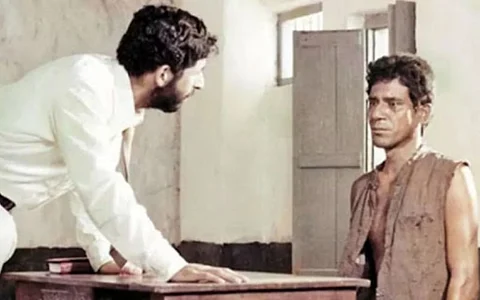
- Reviews
- Power List 2024
- Cannes 2024
- In-Depth Stories
- Web Stories
- News
- FC Lists
- Interviews
- Features
- FC SpecialsFC Specials

Anubhav Sinha's Article 15 opens with a group of lower-caste workers singing a revolutionary folk song about equality. The chorus goes: 'If we tell the truth, you might get offended.' Aakrosh (1980) does not attempt to tell you the truth about caste-related atrocities and their existence. It shows you a series of events and leaves you to make up your own mind. Set in the time and place that it is, oppression is much more invisible here. It permeates through the air and you can feel it with every breath you take, but it isn't quite visible, leaving the oppressed even more voiceless than they are today.
Written by Vijay Tendulkar, Aakrosh is the directorial debut of Govind Nihalani, one of the stalwarts of parallel cinema in India, known for his collaborations with Shyam Benegal. Lahanya Bhiku (Om Puri) is an Adivasi, charged with the murder of his wife Nagi (Smita Patil) in a town in Maharashtra. Bhaskar Kulkarni (Naseeruddin Shah) is the government-appointed defence lawyer and the prosecutor is Dusane (Amrish Puri), Bhaskar's mentor who also happens to belong to an Adivasi tribe. The film plays out as a social drama, with elements of an investigative thriller as we follow Bhaskar trying to get to the bottom of the the case. He faces numerous obstacles, not the least of which is his client's unending silence. Bhaskar gets nothing out of his client, who doesn't speak a word during any of their meetings and is forced to look for answers elsewhere, which puts him through a journey of discovery about his surroundings.
The oppressed don't plead their case here. There is no case to plead. They have been told about their place in the world the moment they entered it and justice isn't something for them to dare to wish for. We don't get dramatic scenes where the victims and their kin, after having been silent for too long, finally reach breaking point and face up to their oppressors with an unflinching monologue, leaving behind all their fears and providing us with satisfaction and catharsis. The writing is much more loyal to reality than that and it ensures a frustrating viewing experience for the viewer.
The film is shot through a middle-class lens. It puts us right in the shoes of Bhaskar, a middle-class idealist with preconceived notions about 'these kinds of people'. It doesn't attempt to make Bhiku something he is not in order to gain your sympathies for him and his people. Bhiku doesn't speak a word through out the entire film barring a couple of flashbacks which serve as glimpses into his marriage and thereby his character. And in those flashbacks, we see him being drunk and violent. The film doesn't take the route of making the victim likeable in any sense for you to buy into his plight. You inevitably do.
Om Puri gives the performance of his life, with not more than 100 words of dialogue. Acting with the eyes always felt like a bit of an exaggerated idea until I watched this performance. They didn't gloss over the pockmarks on his face, which was not usual at the time.
Throughout the film, we see Bhaskar's idealism clash with Dusane's practicality. They have student-mentor meetings throughout the film where Bhaskar keeps trying to link various inexplicable and sinister happenings to the case in an attempt to look deeper than the surface and is always met with Dusane's laughing dismissal. Dusane dismisses this as nothing but conjecture and the naïve enthusiasm of a first time lawyer. He urges him to stick to facts and what's in front of him. Dusane swears by the book and worships the letter of the law. He believes the truth to be what can be proved inside the courtroom.
The climax has one of the most uncompromising and comprehensive scenes, which conveys hundreds of years of plight in one bone-chilling action better than hundreds of pages of dialogue ever could. In the aftermath, both jaded and enlightened by the realities of the world he grew up in, Bhaskar has one final confrontation with Dusane. He asks whether he would dismiss Bhaskar's death as an unrelated event, if he were to die while investigating the case. Would he look further than the surface or would he refrain from conjecture? Dusane says he will stick to his philosophy. Bhaskar walks away and the film ends.
This is when you realise that Bhaskar's idealism is also his privilege and Dusane's practicality is a result of the sword of Damocles hanging over his head. In a world with systemic oppression, sticking to the rules of the system ensures the same, inevitable outcome every time. The design is that of protecting the oppressors and preventing the underprivileged from ever rising. It is impossible to prove the obvious in a system like this. Dusane's uplift in social status is a precarious illusion of social mobility. This illusion can be shattered if he ever puts a toe out of line or ruffles the feathers of the people above him. It is this reverence for the rulebook written by the powers that be that has enabled him to elevate himself from one kind of slavery to a more sophisticated kind.
If you like to think of yourself as socially aware and are frustrated with the dearth of films about important issues, watch this one and pass it on.